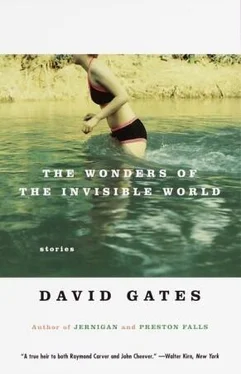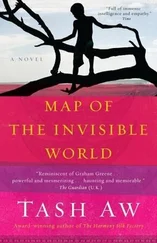“I would hope so. You want another hint? Eighteenth century.”
“You’ll have to tell us,” Karen said.
“Samuel Johnson.”
“I don’t see that at all,” Karen said.
“I’m not really familiar,” Allen said.
“Allen’s more into John Le Carré,” said Karen.
“Come on, I read good stuff, too.”
“Nothing wrong with John Le Carré,” Paul said. “I’d a hell of a lot sooner read him than fucking John Updike. If we’re talking about Johns here.”
“You realize that’s the second mean thing you’ve said about John Updike?” Karen said. “Why do you have such a thing about him?”
Paul snorted. “I wonder.”
Faye swirled the sediment in her wineglass. Alcohol was so interesting, she thought. Interesting just to sit here with all this loud talk going on around you and yet to feel safe. She’d probably feel even safer lying down on the bed, and maybe in a while she’d get up, excuse herself and go do just that. The dishes could wait until morning: no cockroaches up here. And Paul could flirt with her sister all he wanted because Karen’s husband was on hand.
“Hey, actually I’ve got one,” Allen said. “I’m thinking of somebody that looks just like Cecilia Bartoli.”
“Who the hell is that?” said Paul.
“Cecilia Bartoli? Opera singer?”
Paul shrugged. “I heard of the Three Tenors. That’s what opera singers you get up here in the boonies.”
Now, what was this about? Paul never missed the Metropolitan Opera broadcast on Saturday afternoon — unless his redneck friends were in the house. His all-time favorite tenor was Jussi Björling.
“But you get PBS, don’t you?” Allen said.
Faye poured herself more wine — just a touch. Karen’s husband was going too far with Paul, but she was too drunk to imagine how to warn him.
“I told you,” Paul said. “This is the fuckin’ boonies, right? I like it to be the fuckin’ boonies. Because all that crap is interchangeable. You know? Spaghetti-bender of the month. I mean, after a certain point ”—waving his hand, he knocked over the current wine bottle, then quickly righted it, leaving just a splash of maroon on the white tablecloth.
“Good hands,” Allen said. “So you give up?”
“I don’t give up, ” Paul said. “I just don’t happen to know what the hell you’re talking about.”
“ I give up,” Karen said. “If that helps.”
Paul turned to her. “You don’t believe me about Samuel Johnson. Don’t go anywhere.” He got up and headed for the living room, walking surprisingly well.
“Does anybody want to hear my thing?” Allen said.
“I do,” Karen said.
Faye took another sip.
“Your sister,” he said.
“What? No way,” said Karen. “Okay, you’re cut off.”
“But it’s true,” he said. “Am I crazy?”
Faye closed her eyes and began to count. Maybe to fifty, she thought.
“There. Check it out,” she heard Paul say.
She opened her eyes and saw him laying a book beside Karen’s plate: a gray paperback whose cover showed a fat, peevish-looking, full-lipped man in a wig.
“Okay,” Paul said, “now picture Mama Cass.”
“I am,” Karen said. “I think you’re as nuts as my husband.”
Faye closed her eyes again and considered proposing Richard Dreyfuss, but she couldn’t tell if the game was over or not. Anyhow, it might take things someplace weird.
“What’s it like for you, living here?” Karen said. They were walking up the path to where Faye knew there were blueberries, both swinging Medaglia d’Oro coffee cans. Faye had made holes in them with Paul’s electric drill and attached pieces of clothesline for handles.
“I don’t know,” Faye said. “It’s like — I don’t know. I mean, it’s like living anyplace, except it’s … I don’t know what to tell you.”
“Sorry,” Karen said. “I didn’t mean it to be a tough question.”
“Oh no, it’s a legitimate question. I just, I don’t really think about it. I mean, is it better than the city? You know, sure, in some ways. Having the space. Plus just being able to just go out your back door.”
“Allen and I talk about it sometimes,” Karen said. “I mean, we eventually do want to have kids, and it would be so much better in a place like this. But right now there’s no way.”
“You don’t think? I bet if Allen played his cards right he could get a job on the road crew.”
“Right. How’s Paul dealing with that?”
Faye shrugged. “Like a pig deals with shit. He’s running the grader, he’s running the backhoe, the bushhog — whatever it all is. The big roller. Last winter he was on night call for the snowplow. All he needs is a gun rack for his pickup.”
“He doing anything on his book? Wasn’t that part of the idea?”
“The magnum opus? You never hear about it anymore. I assume it’s fallen by the wayside.”
Karen shook her head. “Waste.”
“I don’t know,” Faye said. “Waste of what? He claims he’s happy. Gets him outdoors, plenty of exercise — hasn’t he given you the whole rap?”
“What about you, though?”
“What about me? I’m here, no? If I ever think of something else, I’ll think of something else.”
“There aren’t any other papers or anything?”
“Sure, this is the land of opportunity. Can’t think why everybody isn’t up here.”
They climbed over a tumbledown stone wall into a field of thigh-high saplings. A jay screamed. Faye squatted and stretched out her hand, palm up, to touch one leaf in a patch of low, tidy-looking bushes.
“A blueberry bush,” she said, pronouncing the article like the letter A.
“God, look at them all,” said Karen, getting down on her bare knees. “You weren’t kidding.”
“No, not my style. You can pick here. I’ll hit the other side.” The first berries started pinging into the coffee cans. Then only the rustling of the bushes as their hands tore at the berries, and the screams of the jays.
“It’s so quiet here,” Karen said. “I actually had trouble getting to sleep with nothing but the katydids.”
“Yeah,” said Faye. “This is the time of year you start hearing them. I still have trouble myself. It’s like, the one thing stands out more when there’s just silence. Though I personally didn’t hear jack shit last night.”
“I bet. I was worried you might be sick, but Paul said you were okay.”
“Paul should know.”
Karen shot her a glance. “Are you guys fighting?”
“That’s a quaint enough way to put it. No.”
“Oh.” Karen went back to picking, then stopped and stared at Faye. “At the risk of being put down definitively,” she said, “I would like to note that (a) I’m your sister, (b) you do not seem happy, and (c) if something’s wrong I’d be glad to listen.”
Faye shook her head. “It’s not really any one thing. Just the usual.”
“I know I shouldn’t ask this,” Karen began.
“No, you shouldn’t. Whatever it is. I’ll tell you one thing: about sixty-five percent of the problem is that I’m hung over and this sun is giving me a headache. We must have about enough. Let me see what you’ve got.” Karen tilted her coffee can toward Faye. “Well, not quite. We want to make two pies, and these things cook down.”
“You make them in twos?”
“The frugal hausfrau,” Faye said. “Costs money to run that gas stove, you know. Actually, one is for you guys to take with you.”
“Really?”
“No,” Faye said. “I’m kidding you again.”
By the time they got back to the house they were both sweating, but it was cool in the kitchen. Karen lifted the tightly rolled bandanna from around her head and shook her hair out with both hands. It struck Faye that she’d only seen this style in magazines. Then it struck her that Karen obviously had been wearing the bandanna all morning.
Читать дальше












